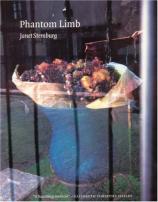Critical Praise
"When I first read Phantom Limb some months ago, it moved me deeply. It is evocative, raw, absolutely genuine and original and I was stunned that the author had the courage to share so much of herself."
——Harvard Bookstore (PW Bookstore of the Year) Nancy Fish, Marketing Manager
"Janet Sternburg has found the perfect metaphor for the tragedy of pain and loss, the ultimate inevitabilities of life."
——Bill Moyers, broadcast journalist; editor Healing and the Mind
"Janet Sternburg uses her book, Phantom Limb, as the springboard for a medical, metaphorical and spiritual meditation on the loss of a loved one."
——KCRW, "Politics of Culture"
"A haunting memoir- a poem of remembered pain -- an absence that becomes in the telling an unforgettable presence. I am undone by this book."
——Elizabeth Forsythe Hailey, author of A Woman of Independent Means
". . . part moving account of greater love in the face of her mother's approaching death, part medical inquiry into neurology, and part spiritual meditation on the struggles and sufferings that living visits on each of us. Sternburg shows that emotional and spiritual integration is possible . . ."
——BookList
'Feelings shared by countless others . . . The author movingly recalls her great sense of bereavement after her mother died, the loss of treasured rituals of association -- phone calls, conversations about new curtains or a picture. . . luminously detailed recollections . . . moments of consoling happiness."
——Kirkus
"Sternburg discovers that her search for consolation involves an acceptance of the pain of loss . . . the very scarcity and unreliability of our memories makes them precious."
——LA Times Book Review
"This is a memoir for anyone who has suffered a significant loss . . . compassionate, painful, and joyful. . . "
——Library Journal
"At a time when many people are writing and publishing memoirs, Sternburg's Phantom Limb (University of Nebraska Press) is uncommon. The book is a meditation on memory. The author experiences difficulties and writes about them, but she does so without a sense of victimhood or self-pity. Instead, she tells a tender story of the expansiveness of love."
——The Jewish Week








